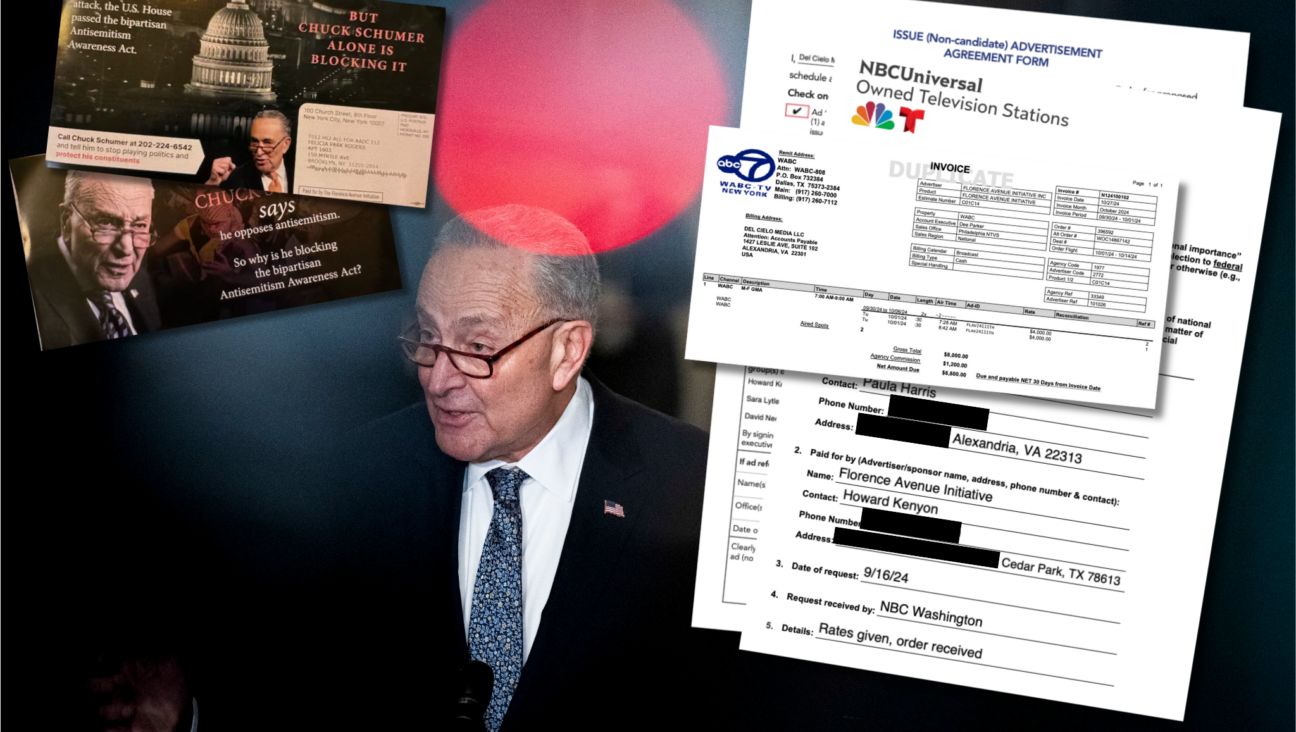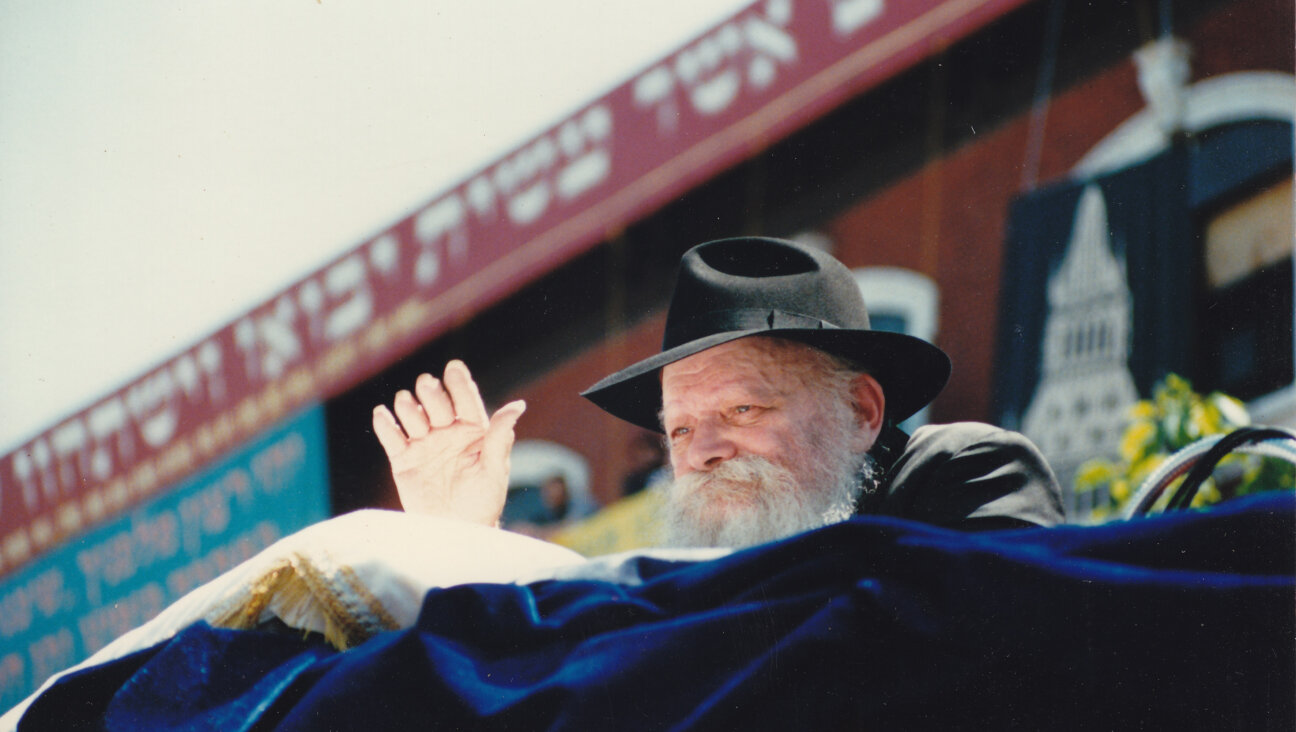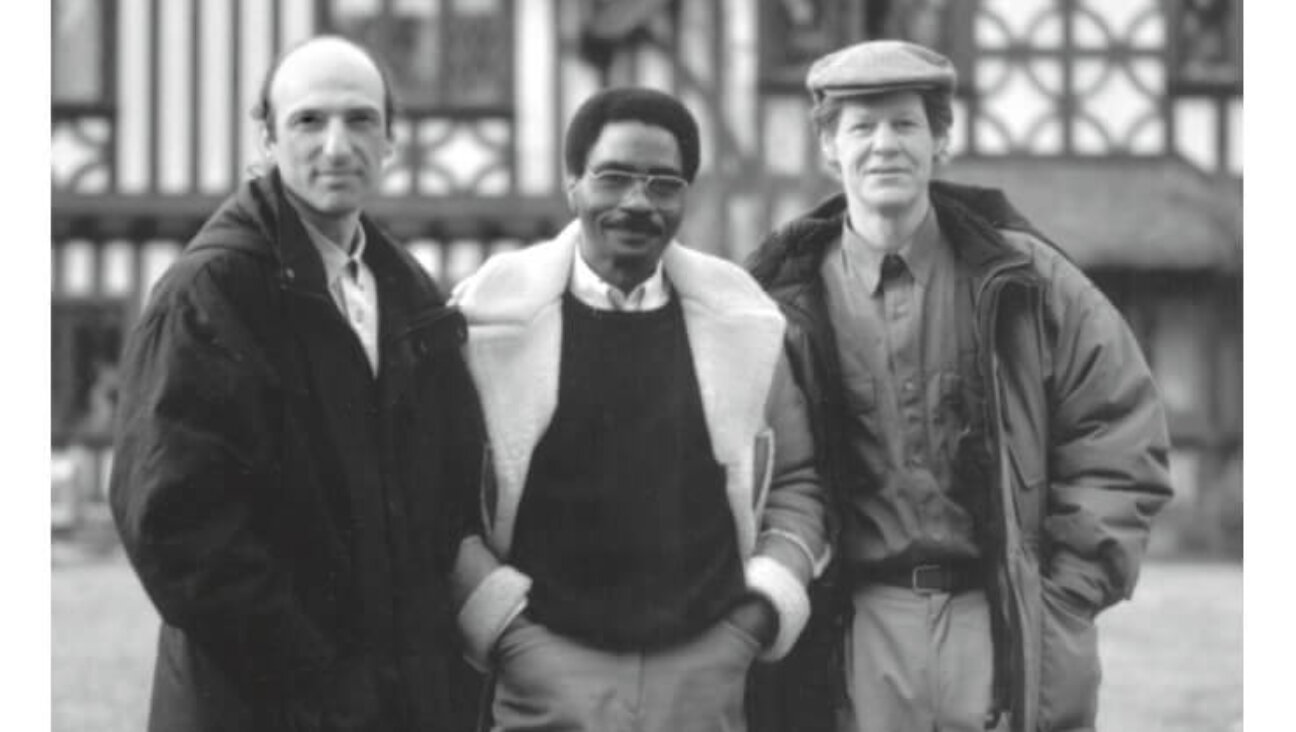May 28, 2004
Milken Misrepresented
A May 14 article previewing Michael Milken’s keynote speech to an Israel Bonds event was partially correct to the extent that it described Milken’s extensive philanthropy, widespread support of Jewish causes and his “message of solidarity” for which “all Jews and the people of Israel should be very grateful” (“Junk-bond King To Keynote Israel Bonds Event,” May 14).
Unfortunately, however, the article contained several factual errors. Most regrettably, it presented a caricature of Milken that bears no resemblance to the man I’ve known my entire life and whom I honored when I was chairman of another Israel Bonds dinner at which he spoke.
Forward readers would assume from the article that Milken’s “ledger of good works” is a recent phenomenon designed only to burnish his reputation. Such a cynical interpretation is totally at odds with the facts. He started his philanthropy in the 1970s, a decade before any legal issues arose, when he began to focus on medical research. He formalized his individual efforts in early 1982, when few people had ever heard of him, with the formation of the Milken Family Foundation.
Over the past two decades, the Milken Family Foundation has been one of America’s most innovative forces for the advancement of education, medical research and Jewish causes. These have been Milken’s lifelong passions, and they have nothing to do with “reputation.” In fact, much of his early philanthropy was anonymous and was disclosed only later when he was forced to defend himself from attacks that many commentators have concluded were politically motivated.
From the first time he spoke on Wall Street, in 1969, to his most recent articles and speeches, there has been only one Michael Milken. His socially positive views and concern for the community are reflected in his writings. As for his financial career, the theories of capital formation and job creation that he developed in the 1960s, once thought revolutionary, were proven in the marketplace by 1976 and are now taught in every business school. His implementation of these theories provided capital to thousands of growing companies that were able to create millions of jobs. His ability to “democratize capital,” which helped stimulate unprecedented economic expansion in the United States, has been copied by the growing number of countries that have adopted market-based reforms.
Contrary to statements in the article, Milken is free to invest in and consult on transactions; the SEC never made any finding, nor did it even allege, that he used philanthropic events to facilitate financial meetings; and he has never been at a philanthropic event with Jack Welch. In fact, the United States Attorneys Office in New York investigated the conduct that was the subject of the SEC inquiry that Milken settled, and wrote a letter to the court that they found no wrongdoing.
My intent is not to provide a litany of journalistic failure. Rather it is to express disappointment that the Forward would take such reckless and unsubstantiated shots at my decent and humane friend, who was giving up a Sunday to travel across the country so that he could honor another major supporter of Israel Bonds and help a Jewish organization. In doing so, he was advancing an agenda in which all Jews who care about the well-being of our community and of Israel so fervently believe.
Richard Sandler
Maron & Sandler
Santa Monica, Calif.
The writer is an attorney who
has represented Michael Milken.
O.U. Firm on Stem Cell
A May 21 article suggesting that the Orthodox Union has made a “decision to mute its opposition to [President] Bush[’s policy] on stem cells” could not be more inaccurate.
The O.U.’s position on this matter, developed in collaboration with the Rabbinical Council of America by a special panel of rabbis, scientists and other community leaders that we convened, clearly states our support for this potentially life-saving research and that it should be supported by federal funding. In fact, among the Jewish community’s national religious and public policy organizations, we were the first to enunciate this position, which clearly differs from Bush’s policy decision of August 2001. We stood by it then, and we stand by it now.
Moreover, while the article accurately reported our perception that “the president is not going to change his policy,” lobbying the White House is not the only means by which one might seek to alter this policy. Toward this end, the O.U. has endorsed and actively supports legislation sponsored by Senators Arlen Specter, Edward Kennedy, Orrin Hatch and Dianne Feinstein, which would overturn the president’s policy and provide federal funding for such research.
The O.U., joined by the Union of Reform Judaism, spearheaded the effort to put the entire organized community on record in support of this position by proposing a resolution embodying this policy at the most recent conference of the Jewish Council for Public Affairs, a resolution that passed unanimously. We have worked more informally toward this goal, as well, in conversations with elected officials, biotech industry leaders and others.
In matters of public policy, the O.U. prides itself on serving the interests and values of the Orthodox Jewish community, and other allied communities, by promoting initiatives on the basis of the honest interpretation of our tradition’s teachings. Our most valuable asset in this regard is fidelity to our principles without regard for partisan politics. On the matter of stem-cell research, as others, we continue to follow this path.
Nathan Diament
Director
Orthodox Union
New York, N.Y.
Consensus on Torture
A May 16 article on the response of Jewish groups to the prisoner-abuse scandal at Abu Ghraib prison quotes Malcolm Hoenlein, executive vice chairman of the Conference of Presidents of Major American Jewish Organizations, as saying, “There are differences of view on this issue, so it’s not something on which there is a previous precedent and we could issue something right away or where there is complete consensus” (“Prisoner Abuse Controversy Rages, Most Groups Keep Quiet”).
Jews have no “consensus,” no “precedent” about torture? Tell it to Torquemada. He’d be pleased.
Nothing could have made clearer the moral bankruptcy of almost all the official Jewish “leadership” in the United States than this statement and the silence of the Jewish Council for Public Affairs.
Long ago, our Torah taught us what to expect from the unbridled use of power. We called it “Pharaoh” or “Antiochus.” For millennia, we have known that power tends to corrupt, and that absolute power corrupts absolutely.
The American military put absolute power over prisoners in the hands of “guards” in Abu Ghraib. Why should we have expected any different? The present administration claimed absolute power to lie to the American people and the world in order to kill hundreds of Americans and thousands of Iraqis; to violate international law, the United Nations Charter and the Geneva Conventions; and to arrest American citizens on American soil and hold them for years incommunicado.
Rabbi Abraham Joshua Heschel, when the official Jewish leadership a generation ago was cravenly refusing to speak out against the Vietnam War, said: “In a free society, some are guilty; all are responsible.”
Almost the entire American Jewish leadership has shown it is irresponsible. We must start at the grass roots to create a Jewish community that is responsible to God, Torah, the Jewish people and the world.
Rabbi Arthur Waskow
Director
Shalom Center
Philadelphia, Pa.
Congress Pushed FDR
Leonard Dinnerstein of the University of Arizona was paraphrased in a May 21 article on the David Wyman Institute as rationalizing President Roosevelt’s refusal to intervene against the Holocaust, on the grounds that “Roosevelt was facing one of the most antisemitic Congresses in American history, which meant that any overt effort for Jews could have lost Roosevelt political capital that he badly needed to lead the war effort” (“Conference Focuses on U.S. Inaction During Holocaust”).
Yet, it was this “antisemitic Congress” that forced Roosevelt to act belatedly to rescue Jews from Hitler. In late 1943, rescue activists initiated a congressional resolution urging Roosevelt to create a government agency to rescue refugees. In the Senate, it had 12 sponsors, 10 of them Democrats and six of them on the Foreign Relations Committee. In December 1943, it was unanimously approved by the Senate committee. The New York Post, for one, predicted that it would pass the full Senate with “practically no Senate opposition.” In the House, the resolution proceeded more slowly as critics used hearings to impede its progress. But a poll in mid-January 1944 indicated it would pass in both houses.
During a staff meeting held by Treasury Secretary Henry Morgenthau Jr. in late 1944, Morgenthau said that their strongest leverage against Roosevelt was “the imminence of Congress doing something.” He called the rescue resolution “a boiling pot on the Hill. You can’t hold it; it is going to pop, and you have either got to move very fast, or the Congress of the United States will do it for you.”
Morgenthau approached Roosevelt in January 1944, asking the president to pre-empt congressional action on the resolution by establishing a rescue agency. The president did, and that agency, the War Refugee Board, played a key role in saving more than 200,000 Jews from the Holocaust. Credit for that must go in part to the very Congress that Dinnerstein claims prevented Roosevelt from helping Europe’s Jews.
Paul Miller
Assistant Professor of History
McDaniel College
Baltimore, Md.
Czech Case Revisited
Imagine my astonishment when I read the April 23 article about Charles Jordan (“Maverick Gumshoe Unearths Leads in 1960s Czech Death”).
In September 1967, I attended a conference of the International Union for Pure and Applied Chemistry, held at the Technical Institute in Prague. At the time, I was director of the chemistry division of the medical laboratories of the Albert Einstein Medical Center in Philadelphia.
My wife, Madeline, accompanied me on the trip. We flew from Philadelphia with a stopover in Paris. There was a delay at the Paris airport, and while I was attempting to get some food, my wife helped a woman with severe scoliosis obtain a luggage carrier that had been appropriated by some “ugly Americans.”
We began talking with the woman, and we told her that we were going to stay at the International Hotel in Prague. She informed us that she lived near the hotel and would like to meet us again in Prague. During the course of the conversation, which was carried on in French (mine rather poor, the woman’s quite excellent), we learned that she was a teacher, and that she had helped Jewish children escape from the Nazis.
After I reported on my research at the conference, my wife and I had time to visit the city and see the sights. One evening, as we got off the trolley car in front of our hotel, we saw the woman whom we had met at the Paris airport. She was obviously waiting for us.
She invited us to her apartment, but we already had arrangements for that evening. She told us that there was a man who wanted to meet us in order to give us some important information. I was quite hesitant, since we were behind the Iron Curtain. I finally agreed to meet him in a park the next day.
He was a man in his early 40s who spoke excellent English, which he told me he learned when he worked as a waiter in Chicago. He carried a portfolio with a considerable number of papers in it, and informed me that the portfolio contained documents that proved the Czech secret police had murdered Jordan and then dumped his body in the river. He asked me to take the documents to the American embassy in Vienna, which was our next stop.
I informed him that I was sure our luggage would be searched, and that it would not be possible for us to carry the documents with us. I told him that when we got to the United States, I would go to the CIA and have them try to contact him. He told me that soon there was going to be a change in the Czech government and that there would be more freedom for the Czech people. He then left the park.
When we got back to the United States, I contacted the CIA in Philadelphia and, as promised, gave them the information about Jordan. We maintained a correspondence with the woman from the Paris airport until we were informed of her death. We never heard from the CIA and had forgotten about the Jordan affair until we read about it in the Forward.
Seymour and Madeline Winsten
Flourtown, Pa.
Myopic Philanthropists
There are princes of Jewish philanthropy who, afflicted with the myopia of their single interest, would have us re-elect President Bush on the dubious ground that he — in a second, lame-duck term — would be a greater friend of Israel than John Kerry in a first term, beholden to his constituencies (“Beating Around The Bush Won’t Make U.S. Safe,” May 14).
That blinkered vision, as expressed by Kenneth Bialkin in a May 14 opinion article, is held notwithstanding the unparalleled mendacity and incompetence of the Bush administration: pre-September 11 detachment, no weapons of mass destruction, no Iraq-Al Qaeda connection, misdirected anti-terrorism, the expense of $5 billion per month, 5,000 American dead and wounded, unmitigated arrogance and worldwide disapproval. At home, we have threatening deficits, tax relief for nabobs, disrespect for civil rights and international law, religious fanaticism, environmental indifference and a wobbly economy.
Friendship for Prime Minister Sharon may or may not mean friendship for Israel, but to be blind to all the great issues that now confront our country except one — and to be overweening about that one — is a marvel of irresponsibility.
Joseph Becker
New York, N.Y.
First Mikvah in Tuscon
I am afraid that the University of Judaism’s mikvah is not the first non-Orthodox mikvah to be built in North America, as claimed by a May 14 letter writer (“Come Clean on Mikvah”). Tucson can make that claim.
Albert Bilgray, the Reform rabbi at Tuscon’s Temple Emanu-El from 1947 to 1972, told me before he died that he received a call from Marcus Breger, the Conservative rabbi of Congregation Anshei Israel from 1946 to 1970. Apparently there was a need in Tuscon for a more traditional synagogue. Together, Bilgray and Breger formed what is today the Young Israel Synagogue. Bilgray insisted that there was a need for a mikvah. In the 1950s, the community raised the money, with the assistance of the Clara Levkowitz family, to build a “community” mikvah.
Though today Young Israel is under the leadership of Lubavitch Rabbi Yossi Shem Tov, he insists that he will honor the use of this mikvah for the benefit of the entire community. This mikvah is used by rabbis from northern Arizona, as well, and is presently the only community mikvah in the state of Arizona. It is now under repair through the generous support of Orthodox, Conservative and Reform Jews in Tucson and around the state.
Not only did Tuscon build the first “community” mikvah 30 years earlier than the University of Judaism, but I believe we can claim the only Orthodox congregation in the world formed by Reform and Conservative rabbis.
Rabbi Thomas Alan Louchheim
Congregation Or Chadash
Tucson, Ariz.
A message from our CEO & publisher Rachel Fishman Feddersen

I hope you appreciated this article. Before you go, I’d like to ask you to please support the Forward’s award-winning, nonprofit journalism during this critical time.
We’ve set a goal to raise $260,000 by December 31. That’s an ambitious goal, but one that will give us the resources we need to invest in the high quality news, opinion, analysis and cultural coverage that isn’t available anywhere else.
If you feel inspired to make an impact, now is the time to give something back. Join us as a member at your most generous level.
— Rachel Fishman Feddersen, Publisher and CEO























